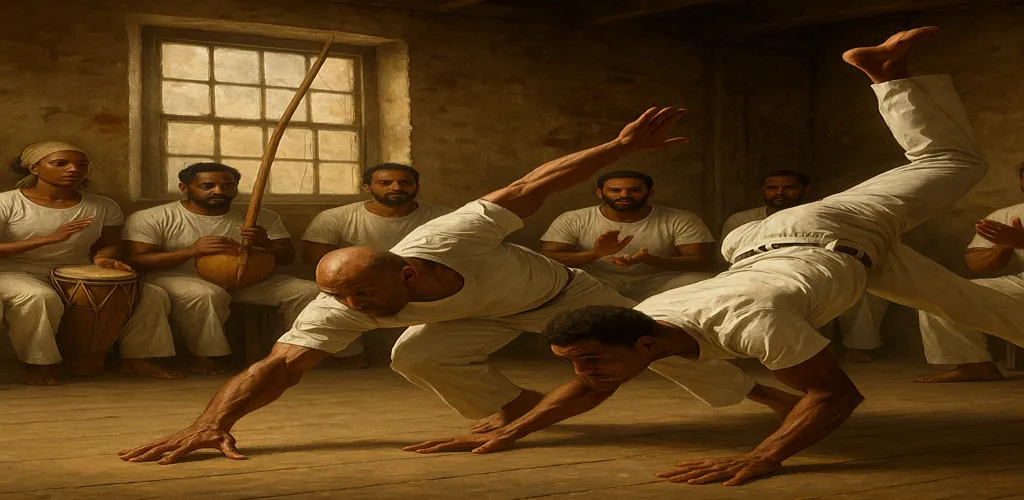Angola

Capoeira Angola is the most traditional and ritualistic branch of capoeira, deeply rooted in Afro-Brazilian history, resistance, and spirituality. It emphasizes low, strategic movements, malícia (cunning), and an ongoing dialogue between players inside the roda. Angola is marked by its slow tempo, intense focus, and powerful symbolism guided by the berimbau’s rhythm. Practitioners study not only the physical art but also the cultural, musical, and philosophical aspects passed down by legendary mestres. The school fosters deep respect for ancestry, tradition, and the capoeirista’s inner journey.
Angola Essentials
About Angola
This section introduces the essence of Capoeira Angola—its ritual structure, spiritual depth, and cultural roots. Learn what defines Angola as a unique and historically rich art form.
Angola History
Explore the lineage of Capoeira Angola, from its origins among enslaved Africans in Brazil to the preservation efforts of mestres like Pastinha. This section traces key events, suppression, and survival.
Philosophy & Approach
Capoeira Angola teaches malícia, patience, and respect as core principles. This section reveals how Angola’s philosophy shapes movement, relationships, and self-awareness within the roda.
Techniques & Style
Delve into Angola’s distinctive style—low movements, expressive gestures, slow deception, and controlled interaction. Learn how these techniques contrast with faster Regional variations.
Traditions & Etiquette
Angola is steeped in tradition, from call-and-response ladainhas to ceremonial entrances. This section outlines etiquette rules, musical roles, and unspoken customs that honor the lineage.
Uniform & Symbols
Angola practitioners often wear yellow and black or plain white uniforms, with visual references to Mestre Pastinha’s school. Explore the meaning behind colors, logos, and accessories.
Weapons
While Angola is unarmed in combat, its traditional instruments—berimbau, atabaque, agogô—are essential cultural “weapons.” This section explores their symbolic and guiding role in the game.
Ranking System
Capoeira Angola often rejects formal ranks, focusing instead on experience, wisdom, and community recognition. Here you’ll learn how elders are honored and how progression is measured differently.
Angola Glossary
A curated list of Angola-specific terms, chants, and expressions—from “ginga de Angola” to “chamada”—helping practitioners and enthusiasts decode its rich vocabulary.
Notable Figures
Meet the guardians of Capoeira Angola: Mestre Pastinha, Mestre João Grande, Mestre João Pequeno, and others who carried the tradition through generations.
Branches & Organizations
Explore the diverse groups dedicated to preserving Capoeira Angola worldwide. This section outlines how different schools and mestres interpret and maintain its legacy.
Competitive Format
Capoeira Angola is not competition-driven, but rodas may reflect mastery through improvisation, rhythm, and presence. This section explains how Angola celebrates skill without formal scoring.

